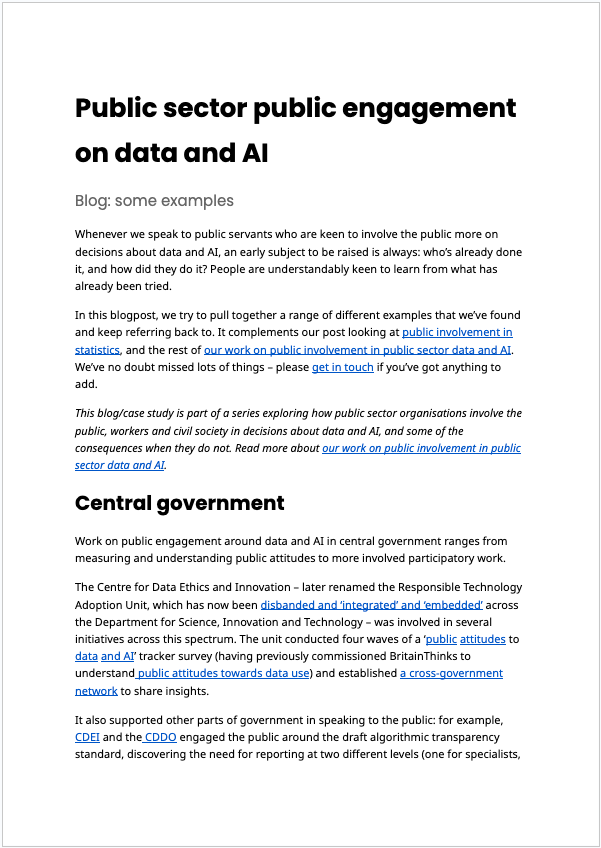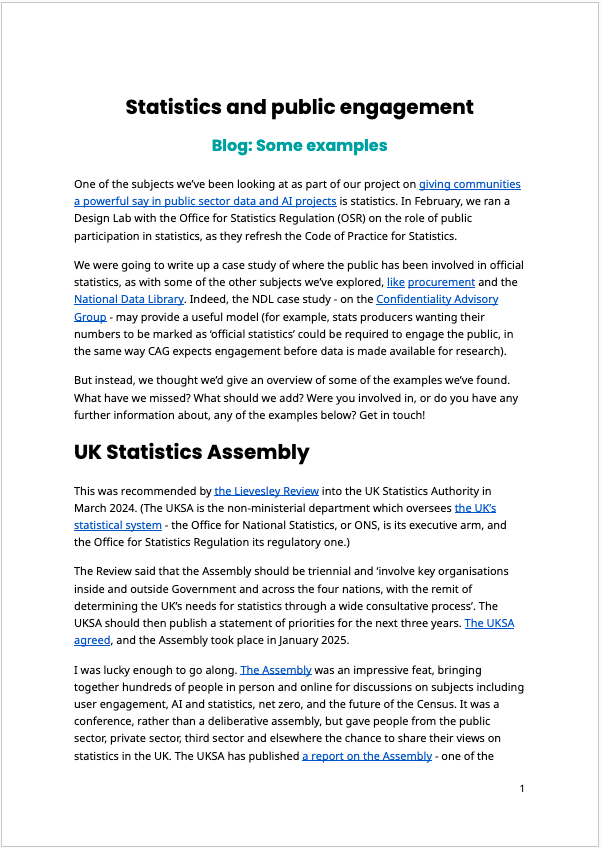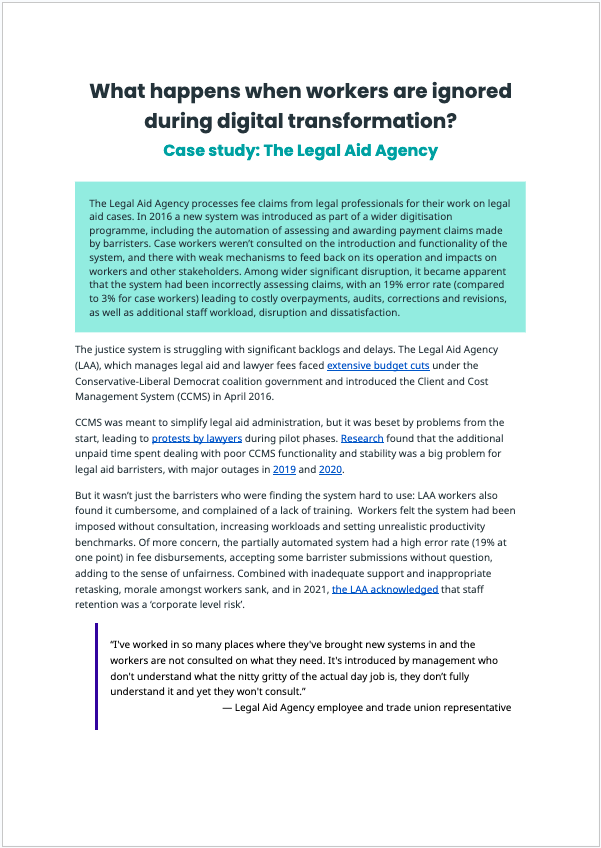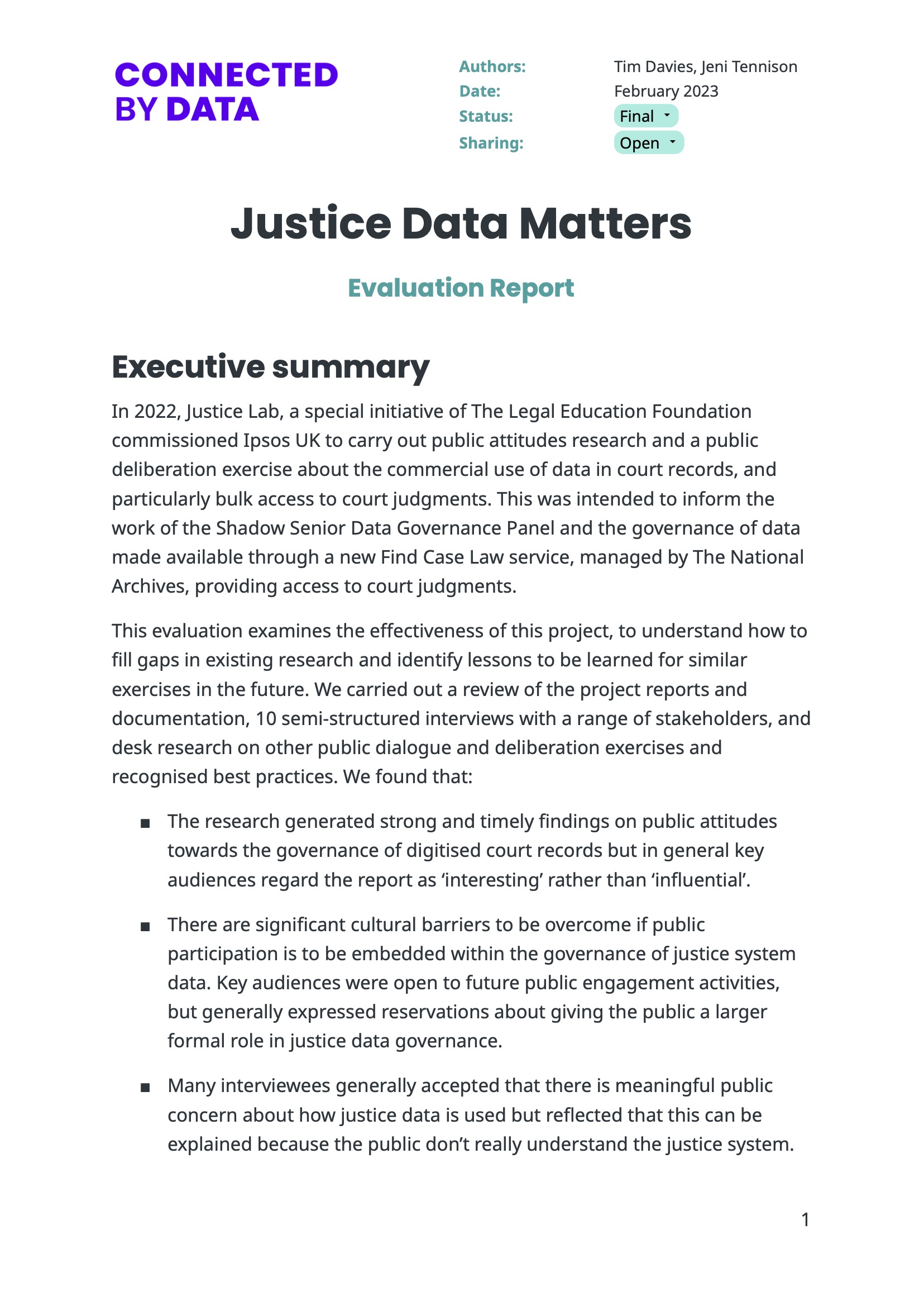Justice
Giving victims, litigants and legal professionals a powerful say


The justice sector is affected by advances in data and AI just like any other, as it contends with a massive court backlog and cuts to legal aid. It is exploring ways in which data and AI can improve justice and access to justice through a range of digital services that rely on better access to and use of data. Along the way, the sector is contending with legacy systems, failed rollouts, missing data, and the complexity of balancing privacy and open justice in a digital age.
Working with scholars and campaigners, we are exploring how to ensure that public interest and access to justice are kept at the heart of data and digital reforms in the justice sector.
Whenever we speak to public servants who are keen to involve the public more on decisions about data and AI, an early subject to be raised is always: who’s already done it, and how did they do it? People are understandably keen to learn from what has already been tried.
This blog/case study is part of a series exploring how public sector organisations involve the public, workers and civil society in decisions about data and AI, and some of the consequences when they do not. Read more about our work on public involvement in public sector data and AI.
One of the subjects we’ve been looking at as part of our project on giving communities a powerful say in public sector data and AI projects is statistics. In February, we ran a Design Lab with the Office for Statistics Regulation (OSR) on the role of public participation in statistics, as they refresh the Code of Practice for Statistics.
This blog/case study is part of a series exploring how public sector organisations involve the public, workers and civil society in decisions about data and AI, and some of the consequences when they do not. Read more about our work on public involvement in public sector data and AI.
The Legal Aid Agency processes fee claims from legal professionals for their work on legal aid cases. In 2016 a new system was introduced as part of a wider digitisation programme, including the automation of assessing and awarding payment claims made by barristers. Case workers weren’t consulted on the introduction and functionality of the system, and there with weak mechanisms to feed back on its operation and impacts on workers and other stakeholders. Among wider significant disruption, it became apparent that the system had been incorrectly assessing claims, with an 19% error rate (compared to 3% for case workers) leading to costly overpayments, audits, corrections and revisions, as well as additional staff workload, disruption and dissatisfaction.
This case study is part of a series exploring how public sector organisations involve the public, workers and civil society in decisions about data and AI, and some of the consequences when they do not. Read more about our work on public involvement in public sector data and AI.
In 2022, Justice Lab, a special initiative of The Legal Education Foundation commissioned Ipsos UK to carry out public attitudes research and a public deliberation exercise about the commercial use of data in court records, and particularly bulk access to court judgments. This was intended to inform the work of the Shadow Senior Data Governance Panel and the governance of data made available through a new Find Case Law service, managed by The National Archives, providing access to court judgments.
This evaluation examines the effectiveness of this project, to understand how to fill gaps in existing research and identify lessons to be learned for similar exercises in the future. We carried out a review of the project reports and documentation, 10 semi-structured interviews with a range of stakeholders, and desk research on other public dialogue and deliberation exercises and recognised best practices.
Connected by Data was been commissioned by Justice Lab (a special initiative of the Legal Education Foundation) to conduct an evaluation of the public deliberation exercise that led to the report Justice Data Matters: Building a public mandate for court data use in order to surface lessons for similar future exercises within and outside the UK justice system.
Dr Judith Townend is senior lecturer in media and information law at the University of Sussex. Having started her career in media and journalism, she has been working in socio-legal research and policy for more than a decade. Her current research focuses on the protection of public interest journalism, access to information, and media/data governance, in the context of a broader interest in human rights and social justice. Prior to joining Sussex, she was the inaugural director of the Information Law and Policy Centre at the Institute of Advanced Legal Studies.
Dr Natalie Byrom is a researcher and policy adviser with expertise in justice system reform, evidence generation, data-driven technologies and justice data governance. She has a track record of leading high-quality research and translating this into policy impact.
On 14th May 2024, I was a panellist at an expert panel and discussion on the Future of Courts, jointly sponsored by The Nuffield Foundation and Legal Education Foundation in collaboration with UCL Faculty of Laws.
The courts in England & Wales and the USA are witnessing the most significant shift in their approach to the delivery of justice in over a century. The Lord Chancellor and senior judiciary have recently published a Joint Vision for the future of civil and family courts and tribunals. The invitation-only event was organized to focus on the opportunities and challenges that technology poses for courts on both sides of the Atlantic.
On 6th March 2023, CONNECTED BY DATA organised a workshop for Justice Lab (an initiative of the Legal Education Foundation), to explore the next steps they should take around their work to increase public participation in the governance of data within the justice system.
The workshop brought together researchers, civil society advocates and campaigners, journalists and practitioners to explore the questions:
- What does it take to make work in this space influential?
- What topics are most likely to generate buy-in?
- What methodological approaches are most effective for influencing decision making?
- Who needs to be engaged when developing public engagement research, and how?
- Which decision makers/decision points should work in this space target? E.g. decisions about the way data is created, or how data is used?
- What’s the communications strategy around the work needed to achieve impact?





